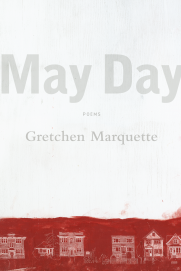Book Review
The speaker of Gretchen Marquette’s first poetry collection often associates with deer or other vulnerable animals. Not surprisingly, the animals don’t usually fare well. In “Deer Suite,” a four-part reflection on memories associated with deer, Marquette writes:
If I say my longing is a doe,
that it bounds,
that it chokes, has parts that splinter,
that it can be split
from breastbone to pelvis. If I tell you
I remember the doe,
strung up in the neighbor’s yard, throat
unzipped
Typical of her style, the poem doesn’t shy away from images of butchered animals. This kind of imagery is visceral in its vulnerability. The question at the end of the poem, “When the deer leave after dusk, / where do they go?” asks the reader to consider the destiny of such longing.
May Day is about longing, love, and loss. There’s no answer for why a relationship that should last ultimately doesn’t. It’s about wanting a child. It’s also about absence—the narrator worries for a brother serving in the military in Afghanistan and Iraq. It has no resolutions, at the end no pregnancy or wedding. Love doesn’t survive. And, although the brother returns, the predominant feeling in the poems about him is one of unresolved waiting, anxiety, and danger. If only danger could be tricked into leaving us alone, as in the fairy tale Hansel and Gretel. In Marquette’s address to Gretel, “Dear Gretel,” she asks:
How did you keep him safe?
Was it merely proximity? Say the danger
is too large to fit in an oven.
What would you do?
Marquette’s poems are full of fundamental questions like this. “Deer through a Boutique Window,” about a doe that’s presumably broken through the glass, asks
How do we get lost in such a small world?
Why are some of us lucky? And some of us
not? There she lies, scent of her own blood
in her nose, the elegant pheromones
in their frosted glass bottles, oblivious,
unbroken on the shelf.
The title of the prose poem “I Know One Thing for Sure” suggests that there is much outside the poem that the speaker feels she doesn’t know. The speaker writes:
I was born first. I want my own child now. I want him to place his hands on either side of my ribcage and make me feel small again. I want to feel the burst of his breath against my neck, just below my ear, the way he breathes when he first finds the part of me he most wants to touch. The damp center. The dying star.
This last metaphor carries forward one of the book’s extended images, that of the stars. The book speaks often of light reaching us from already dead stars, of experiencing love with or without realizing the end is already here, of everything we are burning out.
What’s also striking about the passage is a quality that defines the collection—how often Marquette places in our laps her deepest desires, fears, loves, and losses. This comes through strongly and succinctly in “Lost,” a poem of only three lines:
Weeks after the last time, she bled.
It was startling. There would never be anyone
made from the way he needed her.
Lines like these give the sense that Marquette is putting the most intimate details of herself out there for the world to see. Self-revelation is common not only in writing, but via social media and other expressive outlets. What makes the sharing of such details seem profound in Marquette’s writing and less so, even gratuitous, in other cases? Why do some revelations connect—even ones that don’t directly relate to our own lives— while others do not? Marquette’s collection makes a compelling claim for the importance of honest and deeply personal expressions of experience.
These poems don’t live in a vacuum. They introduce larger contexts of war and struggle through Marquette’s brother’s military tour, while still examining them through a lens of personal absence. In “Gregory,” about visiting her brother at West Point for a ceremony, we read:
I kept mistaking
another girl’s brother for him, marching in formation,
soft haircuts under plumes of black feathers.
He was already less ours. Later,
in blue jeans, he skipped rocks on the Hudson
The plainspoken tone allows for juxtaposition and keen observation that lends power to Marquette’s writing.
Some poems express a desire to share discoveries with a lover who’s already gone, accentuating present loneliness and a connection from the past relationship that’s been lost. “What I’ve Learned about Cottonwoods” reads:
Cottonwood is a riparian tree,
which pertains to rivers. The word arrive
originally meant to touch the shore as in a boat
onto the bank of a river. It’s too late to tell you,
but I think you’d have liked to know—
At a certain point the poems come together to reveal a larger emotional event. In May Day we feel the weight of loneliness, a struggle with loss and emptiness and, toward the end of the collection, a momentary lifting of that weight. The speaker looks beyond her losses and connects with a girl who can’t find her mother among the crowd at Powderhorn Park’s MayDay Parade in Minneapolis.
Reading the collection through, we feel the exertion and exhaustion of a journey, a sense of having come out on the other side, a sense of what it means to wrestle with experience.
About the Reviewer
Brian Satrom lives and works in Minneapolis. His poetry has appeared in journals like Knockout, TAB, and Poetry Northwest, and was nominated for a Pushcart Prize.
